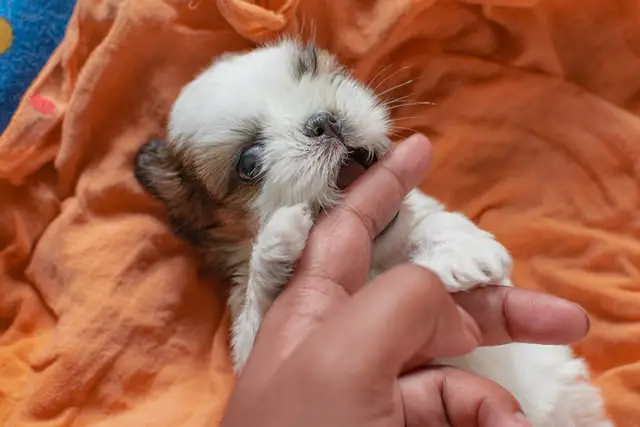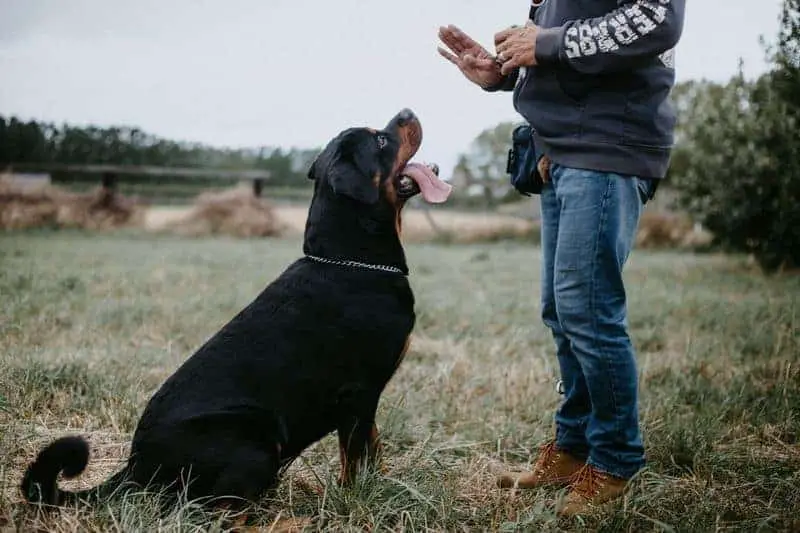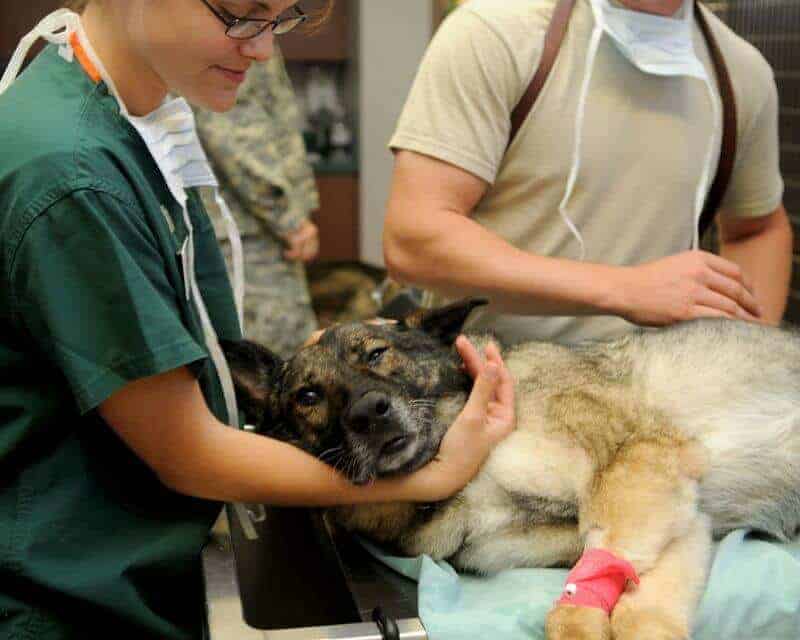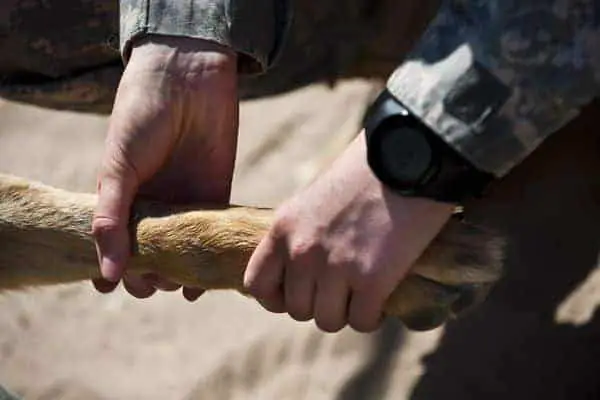If you’ve been looking for a household companion that lives and breathes to be around you, Shih Tzus are a perfect choice. Shih Tzu in Mandarin means “lion dog.” They were initially bred exclusively for China’s royal court. This is why to this day they make such great company with their playful, friendly, and sweet temperaments. are a perfect choice.
These little lions are good for families with children and other dogs. Aside from their winning personalities, a Shih Tzus’ expressive round eyes along with their long and silky coats make them a popular breed among dog lovers.
Recommended Reading: We’ve written a whole article on whether Shih Tzus are a good family dog that you might be interested in.
Another common physical trait you’ll notice with Shih Tzus is their underbites. Shih Tzus have a high chance of having or developing an underbite due to being a brachycephalic breed or a breed with broad short skulls.
It’s natural to want to learn more about this physical condition if you’re looking to adopt a Shih Tzu. You’ll want to know more about it, if it has any implications on the breed’s health, and how you might fix it. Let’s get started by defining exactly what an underbite is.
What Is an Underbite?
When a dog’s upper and lower teeth come together in a normal and unremarkable fashion, the word you’re looking for is “occlusion.” Malocclusion happens when a dog has an abnormal bite. Underbites are considered a class 3 malocclusion.
Underbites happen when your dog’s lower jaw is more prominent and protrudes further than the teeth of the upper jaw. Naturally, the upper jaw ends up being relatively shorter in comparison to the lower jaw. This is often described as a misalignment of lower teeth.
Because of the more forward position of the teeth in the lower jaw, your dog’s baby or adult teeth may not fit together.
Several factors can cause your dog to have an underbite:
Dental
Underbites with a dental origin mean that your dog has a few abnormally positioned teeth that disturb the standard skeletal structure of the face.
With some similarity to underbites of children, a canine’s dental underbite happens when one of the dog’s baby teeth doesn’t fall out. With the baby tooth still in place, the permanent one erupts on the surface causing crowding in your dog’s teeth.
Skeletal
A skeletal cause is when your dog’s facial skeleton is naturally abnormal. These malformed skulls cause the teeth not to fit together correctly.
Skeletal malocclusion is more severe than dental because the incorrect structure can cause your dog’s canine teeth to make unnecessary contact with the gums. This can lead to injury and pain in your dog’s gums and teeth.
Genetics
Genetic underbites are a hereditary condition that is the result of breeding and are passed on from one generation to the next.
Acquired
There are also instances where the underbite is acquired during your dog’s developmental years. Examples of these would be an infection that severed the typical skeletal structure or another animal biting your dog. Being hit by a car or physical trauma directed towards your dog’s jaws can also result in an acquired underbite.
Is It Normal for a Shih Tzu to Have an Underbite?
Underbites are common in brachycephalic breeds like Shih Tzus, pugs, Cavalier King Charles spaniel, Boston terriers, boxers, Brussels griffons, Lhasa apsos, and bulldogs.
Mixed breeds where at least one parent has a brachycephalic skull can also be born with or develop an underbite.
Despite being an irregularity, an underbite is considered by many to be an endearing, ugly-cute feature. Unfortunately, the effects of underbites can extend beyond the physical and can actually make life more difficult for your pet.
Are Underbites in Shih Tzus Bad?
In cases where underbites are classified as hereditary, you have zero to minimal risks to be worried about.
In most cases, your Shih Tzu’s underbite has no negative impact on the way they eat, drink, and self-groom.
When Should I Be Concerned?
At the very least, an underbite should have you watching out for teeth abnormalities and dental problems. You should also regularly check if your Shih Tzu’s underbite is causing your pet discomfort or injury to the surrounding soft tissues of the mouth.
Since Shih Tzus have small mouths, an underbite can lead to misaligned, overcrowded, and sometimes even missing teeth. If left unattended, an underbite can lead to periodontal disease or the extreme build-up of tartar and plaque. This can be serious since it can result in bone loss, gum infections, and other health conditions.
You can prevent and catch these complications early on by having your vet check your dog’s teeth during your Shih Tzu’s regular check-ups.
Can Underbites Be Fixed In Shih Tzus?
Fortunately, most Shih Tzus with underbites don’t require medical intervention. You can leave it as it is as long as you make sure that it’s part of your dog’s regular examination with the veterinarian.
The only time that your vet will suggest a treatment is if your dog’s underbite prevents your pet from chewing correctly, swallowing easily, or if your vet anticipates serious health issues.
If your vet recommends orthodontic treatment, these are the most common solutions that you may be asked to consider:
#1. Forcing Your Dog’s Secondary Teeth to Move
If you had braces as a teenager, then you’re already familiar with this fix.
Yes, dog braces are a thing and they follow the same principle as human braces. An orthodontic brace will provide active or passive force to make the other teeth move into the correct position or at least the right angle.
These slow movements should eventually create a more comfortable and seamless bite for your Shih Tzu. However, before agreeing to this treatment, there are a few things to consider.
Aside from your vet’s approval, your little lion should also be healthy enough for the procedure. On your end, an orthodontic brace entails your commitment in bringing your dog in for regular follow-ups and brace adjustments.
#2. Crown Application or Modification
Crown application or modification means shortening or adjusting your Shih Tzu’s crowns to prevent the tooth from injuring the soft tissue of the mouth, gums, and other teeth.
In terms of human dentistry, crowns are equivalent to dental caps which are a type of tooth repair that covers a tooth.
If your dog doesn’t have an existing crown yet, have your vet walk you through the process first and the required adjustments.
#3. Interceptive Orthodontics
An underbite can also be corrected by interceptive orthodontics or the extraction of your dog’s primary teeth.
Apart from removing the teeth, interceptive orthodontics also involves shortening your Shih Tzu’s teeth. The goal is to address overcrowded teeth and promote a better fit while dealing with any pain or discomfort that your dog may be experiencing.
Do Shih Tzus Outgrow Underbites?
Shih Tzus with underbites due to poor teeth positioning aren’t likely to outgrow their condition especially if they are past 10 months old.
If the underbite is hereditary, the condition is permanent and likely to be passed on to their litter.
Outgrowing an underbite is unlikely. It can also be acquired or grow worse at any point in your Shih Tzu’s life.
Should I Buy a Shih Tzu Puppy With an Underbite?
Teeth abnormalities including underbites are expected for this breed. Most of the time, it isn’t a problem.
Since most cases don’t pose any serious threats to your dog’s health or digestive functioning, an underbite shouldn’t automatically discourage you from purchasing a dog with an underbite. It is normal for Shih Tzus, especially purebred ones, to have or develop an underbite.
For your peace of mind, talk with the breeder and raise your concerns. This is an excellent way to be reassured since most breeders have many clients who are concerned about it.
Reputable breeders can also give you more detailed information about the lineage of your potential Shih Tzu. They can introduce you to your pup’s parents who may have the same underbite yet are living happy and problem-free lives.
If you are adopting from an animal rescue shelter, you can consult their in-house veterinarian to ease your worries.
Additionally, you may also corroborate this information with other similar online resources.
Before a Shih Tzu puppy is released, it’s always given a clean bill of health. This includes the reassurance that the underbite of the Shih Tzu you’re looking to buy will have zero impact on the dog’s quality of life. It’s another reason why you need to find reputable and ethical breeders who are committed to improving the breed.
Once you’ve purchased a Shih Tzu, you should look for a vet that you can have a collaborative partnership with. Regular check-ups should include checking on your dog’s underbite just in case this common condition becomes more serious.
Conclusion: Don’t Be Afraid to Own a Shih Tzu With an Underbite
Don’t be afraid to welcome a Shih Tzu with a less than perfect bite to your family. As long as your dog’s underbite isn’t causing pain and your pet can eat, drink, self-groom, and function normally, you don’t have to do anything about it.
Should it lead to health risks, there are always treatments and interventions available.
While they aren’t something one would specifically look for, it’s sometimes small imperfections like underbites that make our pets distinctively ours and lead us to love them even more.
Featured Image Source: https://unsplash.com/photos/nHdKmwSUGKE








